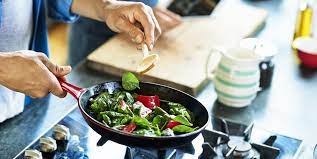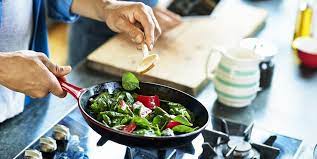Cooking is an art that requires patience, creativity, and precision. Whether you’re a beginner or an experienced cook, there’s always something new to learn in the kitchen. In this blog, we will be discussing some cooking tips and techniques that can help you improve your cooking skills and make your meals even more delicious.
Here are some cooking tips and techniques that can help you improve your cooking skills
Prepping ingredients
One of the most important steps in cooking is prepping your ingredients. Make sure to wash and chop your vegetables and meats before starting to cook. This will save you time and make cooking more efficient.
Seasoning
is key to creating delicious meals. Use a variety of spices and herbs to add flavor to your dishes. Experiment with different combinations of spices to find your own unique flavor profile.
Heat control Controlling
heat is crucial in cooking. Make sure to use the appropriate heat for each recipe. High heat is great for searing meats and vegetables, while low heat is perfect for simmering soups and stews.
Timing
Timing is everything when it comes to cooking. Make sure to follow recipes and use a timer to avoid overcooking or undercooking your meals. It’s better to slightly undercook your food than to overcook it, as you can always cook it more but cannot undo overcooking.
Knife skills
Having good knife skills can make cooking much easier and safer. Make sure to use a sharp knife and practice proper cutting techniques. This will help you cut ingredients more efficiently and reduce the risk of injury.
Food safety
should always be a top priority in the kitchen. Make sure to wash your hands and utensils thoroughly before and after handling food. Keep raw meats separate from other ingredients and always cook meat to the appropriate internal temperature to avoid foodborne illnesses.

Frequently Asked Questions
Sure! Here are some additional frequently asked questions related to cooking tips and techniques:
- How do I keep my food from sticking to the pan? A: One of the most common reasons why food sticks to the pan is because the pan is not properly preheated or the heat is too high. To prevent this, make sure to preheat the pan to medium heat and add a small amount of oil or butter before adding your food. Another trick is to use a non-stick pan or add a layer of parchment paper or aluminum foil.
- How do I know when my meat is cooked? A: The best way to determine if your meat is cooked is by using a meat thermometer. Different meats have different internal temperature requirements, so it’s important to research the specific temperature required for the type of meat you’re cooking. For example, medium-rare beef should be cooked to an internal temperature of 130-135°F.
- What is the difference between baking soda and baking powder? A: Baking soda and baking powder are both leavening agents used in baking, but they work differently. Baking soda is a base, and when combined with an acid (like vinegar or buttermilk) it creates a chemical reaction that produces carbon dioxide, causing the batter or dough to rise. Baking powder, on the other hand, contains both an acid and a base and will react when combined with a liquid.
- How do I prevent my vegetables from getting too soggy? A: Overcooking vegetables can cause them to become mushy and unappetizing. To prevent this, make sure to cook them just until they are tender but still slightly crisp. You can also blanch them by boiling them for a few minutes and then immediately placing them in an ice water bath to stop the cooking process.
Cooking Tips and Techniques
- How do I properly season my food? A: Seasoning your food is key to adding flavor and depth to your dishes. Start by using a combination of salt and pepper as a base. From there, experiment with other herbs and spices that complement the flavors of the dish you’re making. Don’t be afraid to taste as you go and adjust seasoning as needed.
- How do I make my dishes look more visually appealing? A: The presentation of your dish is just as important as the taste. Some tips for making your dishes look more visually appealing include using colorful ingredients, arranging the food in an aesthetically pleasing way, and garnishing it with herbs or other toppings. Using interesting plates or bowls can also add to the overall presentation.
- How do I meal prep for the week? A: Meal prepping can save time and ensure you have healthy and delicious meals ready to go. Start by planning out your meals for the week and creating a grocery list. Cook large batches of ingredients that can be used in multiple dishes, like rice or grilled chicken. Portion your meals into containers and store them in the fridge or freezer for easy access throughout the week.
- How can I improve my cooking skills? A: You can improve your cooking skills by practicing regularly, trying new recipes, experimenting with different ingredients and flavors, and learning new techniques from cookbooks, cooking shows, or cooking classes.
- What are some healthy cooking techniques? A: Some healthy cooking techniques include steaming, poaching, grilling, and roasting. These methods preserve the nutrients in your food and reduce the need for added fats and oils.
- What are some common mistakes to avoid in cooking? A: Some common mistakes in cooking include not properly prepping ingredients, using the wrong heat, overcooking or undercooking food, and not following recipes.
Conclusion On Cooking Tips and Techniques
Cooking is an essential skill that can benefit you in many ways. By following these cooking tips and techniques, you can improve your cooking skills and create delicious meals that are healthy and flavorful. Remember to always prioritize food safety and don’t be afraid to experiment with different flavors and ingredients. Happy cooking!

